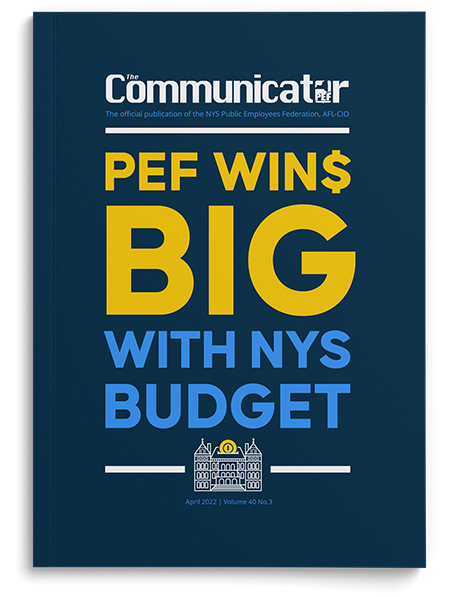
State budgets are usually a mixed bag, at best, for PEF members, but this year the 2022-23 state budget is mainly good news.
The last of the state budget bills were passed Saturday morning, April 9, and PEF President Wayne Spence took pleasure in reporting to members, “Many of PEF’s top priorities are included.”
The budget, which totals approximately $220 billion, contains a 3 percent boost in funding for state operations.
In fact, “It’s the first non-austerity budget since I’ve been PEF president,” said Spence, who first took office as president in August 2015.
A rapid analysis of the budget bills by PEF revealed numerous important wins for the union. These include:
- Pension reform: Working in conjunction with many other unions, PEF secured improvements to Tiers 5 and 6 of the New York State and Local Employees Retirement System, which will hopefully improve the state’s recruitment and retention efforts and lift staffing levels. The 10-year vesting period was reduced to five and lawmakers also agreed to exempt COVID-19-related overtime earnings from mandatory employee payroll contributions to pensions. This change applies retroactively to 2020 and through 2024.
- Health care bonus: The budget establishes a new workforce retention bonus of up to $3,000 for state and other employees who work in health care or mental hygiene positions. PEF tried to get this bonus for all employees who were deemed essential during the pandemic, and the union will continue to fight for bonus pay on behalf of the mission-critical employees who were not included.
- More beds for mental health patients: Funding was included in agency budgets for addiction services and up to 100 additional state-operated inpatient mental-health-stabilization beds. “This was a major request in our ‘Fund Our Future’ campaign to help address the mental health crisis in the state and provide critical services to some of New York’s most vulnerable citizens,” Spence said.
- Nurse loan forgiveness: The budget creates the Nurses Across New York Program that will focus on paying the student loans of nurses who choose to work in hard-to-staff areas of the state. “This idea was first advanced by the PEF Nurses Committee,” Spence said. The benefit will go to both registered professional and licensed nurses in high-demand titles or shortage areas.
Those are just some of the budget highlights that PEF has identified so far. For more information check out this analysis from PEF’s Legislative Department.
“PEF was proud to be part of this collaborative process with elected officials as we work to rebuild our state,” Spence said. “I am grateful for the work of PEF’s Legislative Department, along with that of the Statewide Political Action Committee and all the activists who lobbied lawmakers on behalf of PEF’s priorities. PEF members, friends and families generated more than 18,000 letters this budget cycle and it clearly made a difference. Thank you for all that you do and I promise we will continue to advocate on your behalf.”

